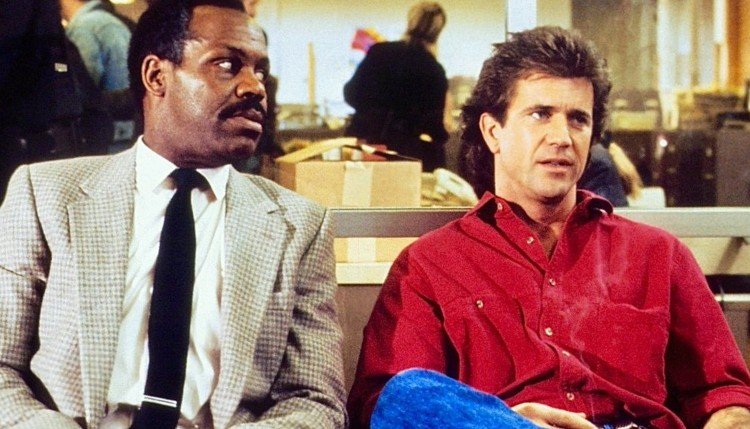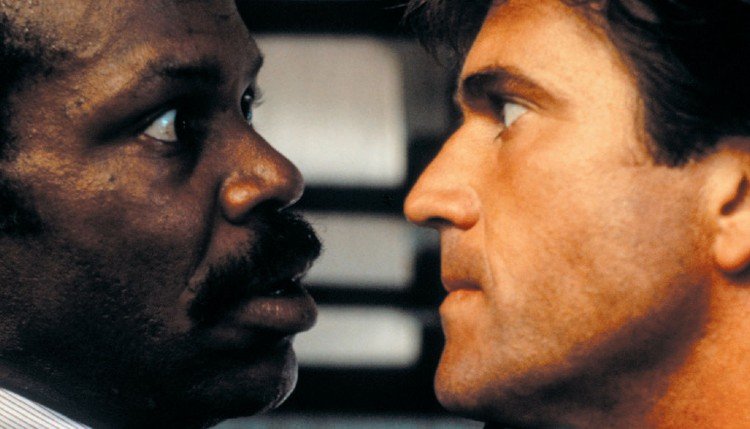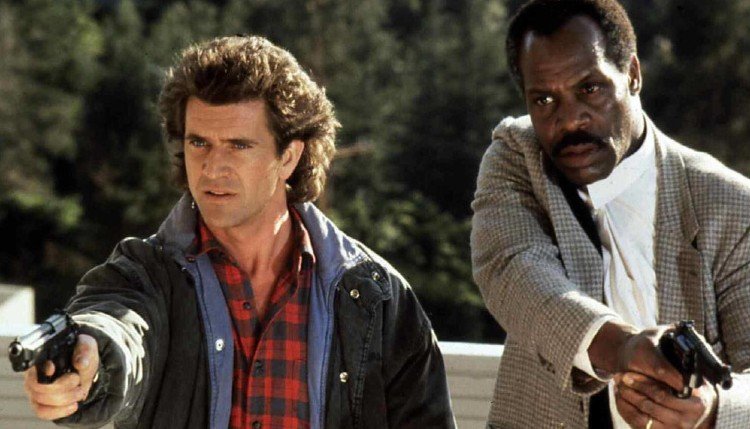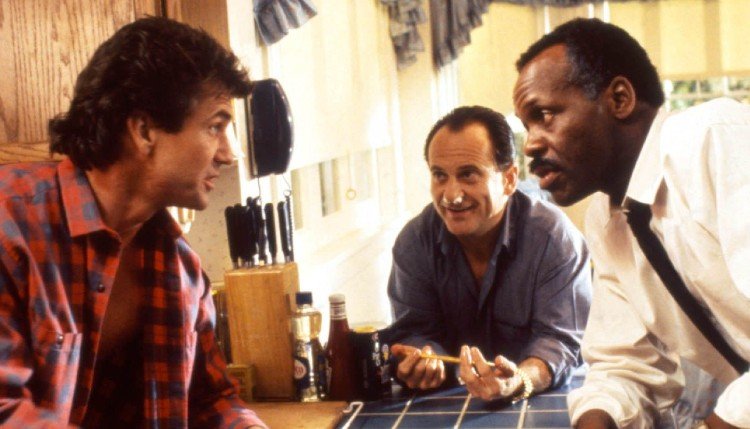Franchise Rewind: Lethal Weapon (1987) Lethal Weapon 2 (1989)
Lethal Weapon, 1987 (Mel Gibson/Danny Glover) Warner Bros.
Lethal Weapon 2, 1989 (Mel Gibson/Danny Glover) Warner Bros.
“I don’t make things complicated. That’s the way they get, all by themselves.”
I don’t know if it was Lethal Weapon specifically, but some movie made in the mid-to-late ’80s influenced an entire subgenre of low-budget action movies that were released either in theaters or direct-to-video. If you take away the star director and the two leads, you would have an easy direct-to-video movie starring the likes of Robert Davi, Marc Singer, or Wings Hauser. If you had cable in the ’90s, these movies were everywhere. It could’ve been Beverly Hills Cop released three years earlier, but Lethal Weapon popularized the subgenre.
The hallmarks of such movies tended to be guns, blondes, kickboxing or another form of martial art, mullets, explosions, and softcore sex scenes. A woman was generally in danger and an angry nonconformist cop, one citation away from turning in his badge and gun, is required to protect her. One thing leads to another and they make love in a cheap motel room while listening to soft jazz, and either of them (or both) die before the end credits roll. There’s also the cop with the past, or the dead wife. That’s Martin Riggs (Mel Gibson) in this case.

Sometimes this crazy cop will be partnered with a more stable, older partner on the verge of retirement. That’s Roger Murtaugh (Danny Glover) in this case. Murtaugh’s old war buddy friend, Hunsaker (Tom Atkins) gives him a call because he’s worried about his daughter, Amanda (Jackie Swanson, Kelly from Cheers), who has taken to drugs and prostitution. She’s dead before the opening credits finish. As it happens, she was poisoned by a group of mercenaries, of which Riggs is familiar: CIA Special Ops. This kind of plot development is essential in these kinds of movies.
What’s innovative is that Riggs and Murtaugh must work together and get to know each other. Director Richard Donner gives them enormous latitude as they improvise fast dialogue off of each other. The story is somewhat labyrinthian with twists and turns that lead to revelations, but it plays against the developing friendship between Riggs and Murtaugh. The better scenes involve Murtaugh and his family as they get to know Riggs. Because Riggs recently lost his wife, he’s suicidal and uncommunicative and the running joke throughout the franchise will be his efforts to avoid Police psychologist, Stephanie Woods (Mary Ellen Trainor).
The wayward (not to mention dead) daughter leads Riggs and Murtaugh to the “Shadow Company” that Hunsaker once worked for who took heroin out of Laos during the Vietnam War, and as a banker in civilian life, Hunsaker laundered the drug money. Hey! That’s illegal! See what happens when you launder drug money? Murtaugh’s eldest daughter, Trish (Traci Wolfe) is abducted by Mr. Joshua (Gary Busey), not necessarily the leader of the Shadow Company, but the guy who gets things done. This is when the bad guys always screw up—they get too close and abduct loved ones. Idiots.

In the end, with all of the bad guys vanquished, Riggs sits down to Christmas dinner with the Murtaugh family. This is a fun movie with a generic story made watchable for Donner’s direction and Gibson and Glover’s free reign with the dialogue. Made on a relatively small budget of $15 million, the first Lethal Weapon took in $120 million. I might be in the minority here, but I thought the sequels were much better. Lethal Weapon was produced by Joel Silver, the quintessential big action movie producer of the 80s and 90s. It was a title he shared with Lawrence Gordon, Don Simpson, and Jerry Bruckheimer.
“They fuck you at the drive-thru, okay? They fuck you at the drive-thru! They know you’re gonna be miles away before you find out you got fucked! They know you’re not gonna turn around and go back, they don’t care. So who gets fucked? Ol’ Leo Getz!”

Lethal Weapon is the reluctant franchise. It was a modest movie nobody expected would become a big hit. Director Richard Donner and his two leads, Mel Gibson and Danny Glover, seemed to be having so much fun making the movie, perhaps it hadn’t occurred to them that Warners would be knocking on their door for the requisite “easy sequel” a year later.
Lethal Weapon 2 is why I prefer the sequels over the original movie. We’ve established the characters and the adventure that seems to walk right up to their doorsteps, burst through their doors, run up their stairs and plant bombs under their toilets. That’s how this movie begins (after some funny business with the illegal transport of South African gold). Detective Roger Murtaugh sits down on his toilet and arms the detonator of a bomb intended to send him to that early retirement home in the sky. What a way to start a movie!
It’s the one big scene I remember (other than “Eeeny, meeny, miney … hey, Mo!”). My wife reminded me of Joe Pesci’s eloquent “drive-thru” soliloquy, which is her favorite bit. It’s hard to believe Pesci’s seedy federal witness, Leo, now makes up the third member of the Lethal Weapon trinity, but here he is, and he would shortly become “family.” He can be grating sometimes, but I think he’s mainly there to provide a sensible sounding board between Rigg’s hysterics and Murtaugh’s goody-two-shoes pragmatism.

These movies are so much fun to watch. They’re almost like comfort food, and as intense as it can get, Gibson, Glover, and now Pesci save the proceedings from getting too murky. This time, we’re dealing with white supremacists looting the national treasury of gold intended for the new government. My only issues are the circumstances intended to “up the stakes” for Riggs. First, he gets a love interest in the form of chief heavy Joss Ackland’s secretary, Rika van den Haas (Patsy Kensit), and then he loses that love interest, which is just terrible, and then there’s a paper thin connection to the death of Rigg’s wife, which felt forced.
In addition to that, Ackland’s henchmen (they all look like models) kill a bunch of cops, but apparently nothing can be done because of Ackland’s “diplomatic immunity.” (“It’s just been revoked.”) Barring these unbelievable developments, this is such a fun movie I can’t help but love. I now leave you with some of more ridiculous (and bizarre) lyrics from George Harrison’s “Cheer Down,” which played over the end titles.
“When your teeth drop out
You’ll get by even without taking a bite
If your dog should be dead
I’m gonna love you instead
The world loves a clown, cheer down
I want you around, cheer down.”

